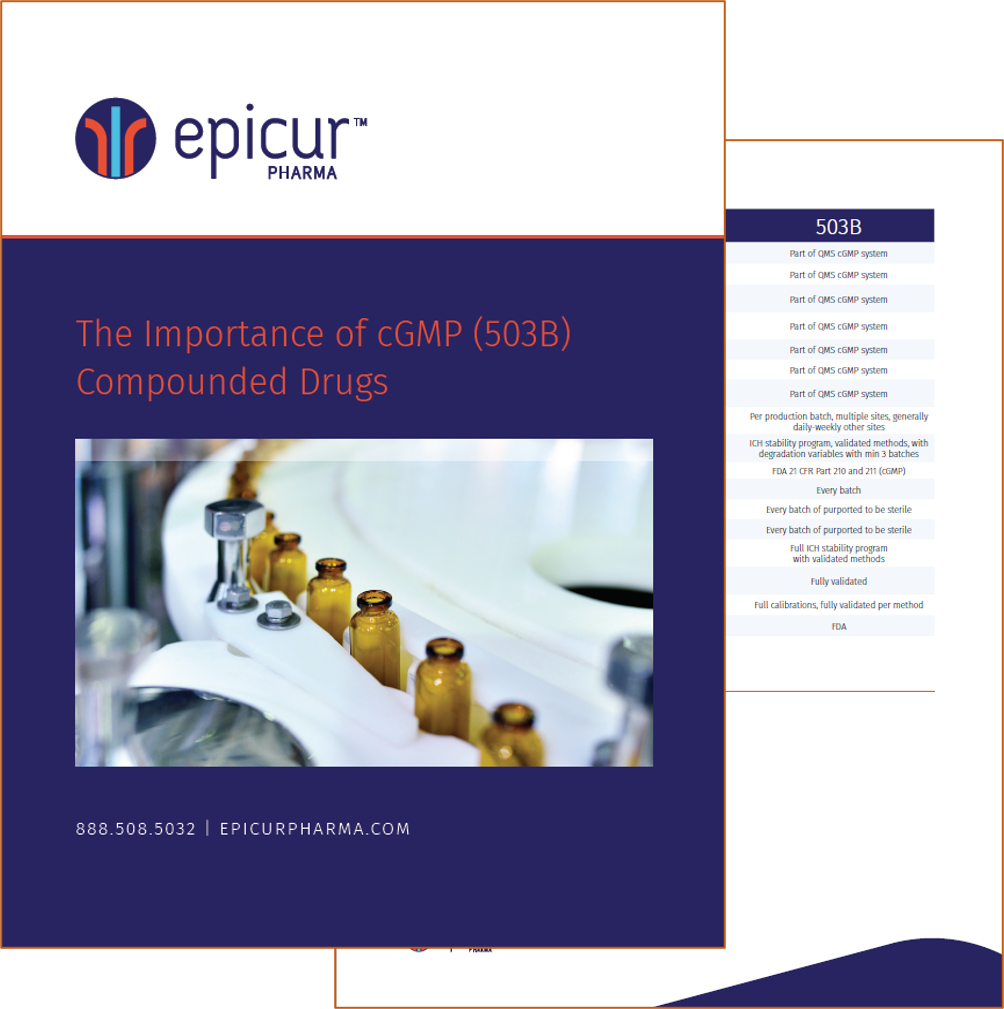The process of sourcing veterinary pharmaceuticals can be challenging. Veterinarians and their purchasing managers must find a balance between drug quality, cost, availability, and patient needs. Thankfully, more sourcing options are available today than ever before.
What’s the Difference Between Traditional Drug Manufacturers and Compounding Pharmacies?
Up until the last few years, veterinary hospitals and clinics were limited to two main options when purchasing medications:
- Mass-Market Drugs – At one end of the spectrum, some traditional manufacturers produce mass-market drugs which are often readily available and have been through stringent quality and safety testing. However, these drugs are targeted primarily to human needs and aren’t offered in concentrations and delivery formats suitable to veterinary patients.
- Traditional Compounding Pharmacies –The other end of the spectrum offers traditional compounding pharmacies, often referred to as 503A pharmacies, such as Stokes Pharmacy, Wedgewood Pharmacy, and your neighborhood compounding pharmacy. The pharmacies can offer patient-specific customized medications, compounding drugs in a variety of strengths, flavors, and delivery formats that meet the unique needs of the veterinary industry. Because commercially available drugs are often unpalatable to animal patients and are offered in concentrations that aren’t the right fit, customization through drug compounding has taken a central role in veterinary healthcare.
However, 503A compounding pharmacies can only produce medications on a patient-specific prescription basis and can’t produce drugs in large batches. They also aren’t required to adhere to the same quality standards as drug manufacturers, so there can be variances in drug integrity and safety.
503B Outsourcing Facilities – A ‘Sweet Spot’ In Drug Manufacturing
While both mass-market drugs and 503A compounded prescriptions have their place, there are times when neither of these choices addresses the needs of veterinary healthcare providers and their patients. Fortunately, there is another option available.
The demand for manufactured veterinary medicines is expected to increase due to two growing factors:
- Increasing client requests for various dosage forms that will improve patient compliance
- The availability of suitable generic veterinary medications remains unreliable
When high-quality manufactured drugs are required in larger quantities, such as in veterinary hospitals and clinics, 503B outsourcing facilities can fill a ‘sweet spot’ between traditional 503A compounding pharmacies and large drug manufacturers.
503A versus 503B: What’s the difference?
Read our short guide for the answers—The Importance of cGMP (503B) Compounded Drugs

The History of 503B Veterinary Outsourcing
503B outsourcing facilities came into existence in 2013 with the passage of the Drug Quality and Security Act, and like major manufacturers of human pharmaceuticals, these facilities:
- Are required to comply with the Current Good Manufacturing Practice (cGMP) regulations established by the Food and Drug Administration (FDA), ensuring the production of high-quality veterinary medications.
- Perform testing for potency, purity, stability, sterility, and endotoxins (if applicable) on every batch of medication produced.
- Sell drugs to healthcare facilities without a patient-specific prescription, referred to as “outsourcing.”
- Manufacture larger batches of ready-to-use drugs needed for office use in veterinary hospital and clinic settings.
Unlike large drug manufacturers, 503B outsourcing facilities provide a greater variety of products that are manufactured under cGMP. For example, 503B outsourcing facilities offer:
- Customized drug therapies based on patient and practice needs.
- Modifications to medication dosages, flavorings, and nonessential ingredients can all be accommodated, improving patient outcomes.
- A wide selection of veterinary medications in a variety of delivery formats including injectable solutions, ophthalmics, oral liquids, and tablets in a range of sizes.
The Importance of 503B Outsourcing
There are important differences between the traditional compounding pharmacies and outsourcing facilities. 503A compounding pharmacies can only produce very limited batches of drugs to fill patient-specific prescriptions, which often increases cost. In contrast, 503B outsourcing facilities can manufacture large batches of medication that veterinary hospitals and clinics can keep in stock for on-demand office use.
Beyond capabilities related to the scale of production, there are significant differences in the quality standards that 503B outsourcing facilities are mandated to meet compared with those required of traditional compounding pharmacies. Both 503A pharmacies and 503B outsourcing facilities must comply with regulations set by state boards of pharmacy and standards put forth by the United States Pharmacopoeia (USP), including USP Chapter <795> for non-sterile compounding and USP Chapter <797> for sterile compounding.
However, unlike traditional compounding pharmacies, 503B outsourcing facilities also must comply with the FDA’s cGMP regulations. Required compliance with cGMP protocols means 503B outsourcing facilities must:
- Provide traceability and follow guidelines for good documentation practices throughout the compounding process to ensure that the products meet the claims on their labels.
- Test every batch for potency, purity, and sterility, and endotoxins (if needed). 503A pharmacies do not have to perform many of these tests, and if they do, testing is often not done on each batch. This means there is no guarantee testing was done for the specific batch prescribed to a particular patient and that the medication can vary from batch to batch.
- Perform extensive stability testing to ensure medications remain balanced over time, so the beyond-use date listed on their products is reliable. This type of testing is not mandatory for 503A pharmacies. Practices could receive expired medications, impacting patient outcomes.
Simply put – the drug quality veterinary practices receive from 503B outsourcing facilities greatly exceeds that received from a 503A.
Although it can be a tricky balancing act to meet clients’ expectations for drug cost and availability while assuring that the drug is safe and effective, 503B outsourcing facilities can help veterinary hospitals and clinics find a happy medium.
Still asking why 503Bs are important?
Watch the video to review the basics!
More Resources to Help:
Our downloads share educational 503B insights and veterinary best practices. Download copies to share with your practice!
Whether you still have questions or you’re ready to place an order, we’re looking forward to hearing from you!



